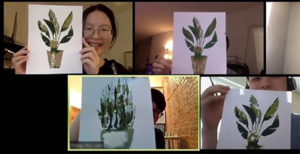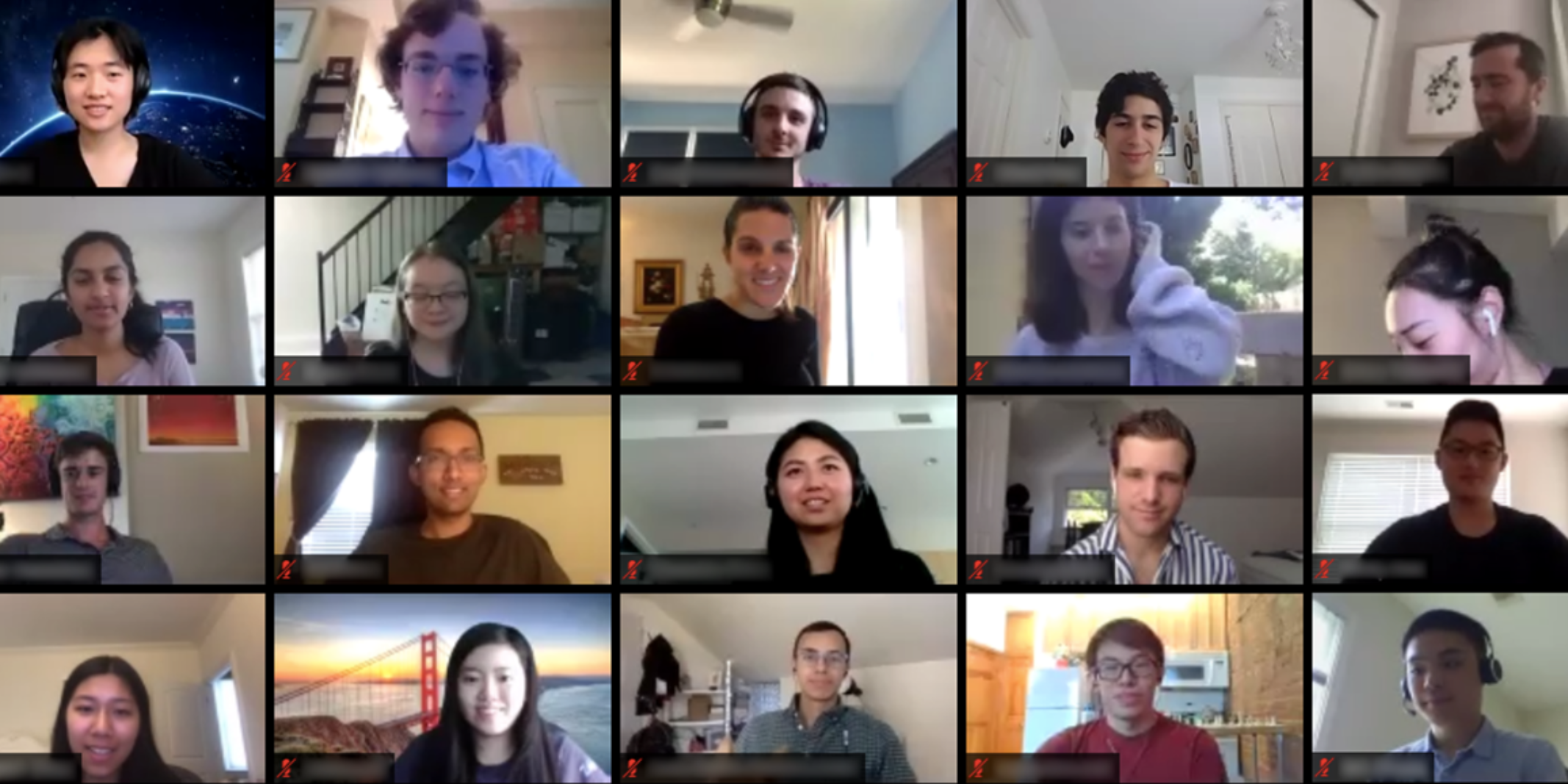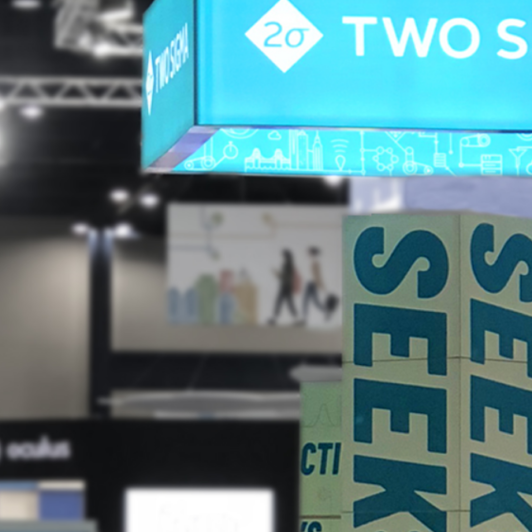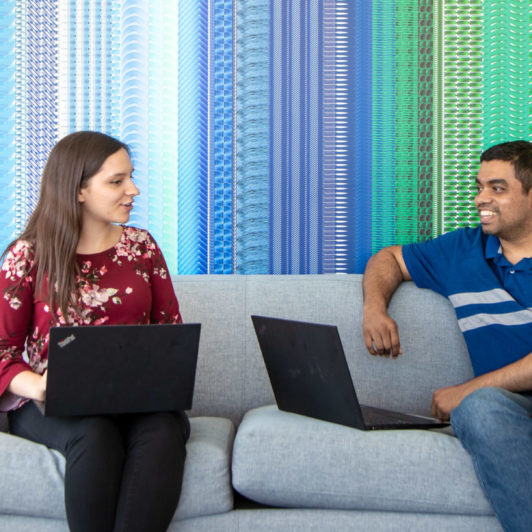Every summer, Two Sigma invites a talented group of interns to work alongside us, innovating, exploring, and wrestling with complex challenges. Much of the value of our internship program–both for Two Sigma and the interns themselves–is in the opportunity to collaborate closely, teach and learn together, and have fun along the way.
With many workplaces closed this past summer–including Two Sigma’s New York, Houston, and London offices, where we host our summer interns–companies had to get creative. Luckily, we love to solve hard problems, so we designed and immersed our interns in what turned out to be a successful, fully remote 10-week program.
This experiment brought plenty of challenges, but we prioritized cultivating a strong sense of community, creating many virtual opportunities for interns to grow their skills, and supporting them as they worked on important projects—-all leading up to their final project presentations during the last week of the program.
We asked some of our 2020 summer interns to reflect on their experiences and offer perspectives for others who may follow in their footsteps during this unusual time. Here’s what they had to say (edited for length and clarity).
How did you prepare for your Two Sigma interview?
Ying, Data Science: I had my resume ready at the beginning of Nov 2019, and applied for the 2020 summer intern position on the Two Sigma official website. I read the interview tips page on Two Sigma’s website and learned the things to expect during the interview process.
Juan Pablo, Engineering: Practicing a few technical problems, like the ones in Cracking the Coding Interview. That and just relaxing before heading to the interview so that I could be calm and confident during it.
Bill, Quantitative Research: I split up my preparation into three directions:
- Statistics: Two Sigma expects you to have basic mastery in statistical techniques like linear regression, t-statistics, and significance testing.
- Data science: Two Sigma wants to see that you understand well the pipeline of obtaining data, constructing features, creating models, and validating them.
- Programming: Two Sigma requires you to be a capable programmer, and this just requires mastering the fundamental techniques (DFS, BFS, dynamic programming, etc.).
Evan, Engineering: Coming into the interview thinking of each code challenge more like pair-programming than an evaluation seemed to help me work through the process.
How was the program structured, and how did Two Sigma compensate for the lack of in-person experiences?
Bill, Quantitative Research: Interns work on a large research project for the summer, interfacing regularly with managers to receive guidance and feedback. Otherwise, it is very autonomous and self-driven: you can take the project in whatever direction you want to. This felt the same virtually as it would have in person.
Ying, Data Science: We were matched with a team and a project to work on throughout the summer. We also had several learning opportunities like training sessions and reading group discussions on different topics and papers. Two Sigma organized several virtual coffee chat opportunities with people from different teams. They also organized events like virtual game nights and Broadway shows, each week for us, so that we could connect with our fellow interns.
Vincent, Quantitative Research: I think that there may have been even more access to my manager; scheduled meetings made our interactions very structured.
Evan, Engineering: The intern program hosted events for us to attend that were well-produced, and I appreciated that there was no implied obligation to go to events on days when I felt tired from looking at the screen. The occasional delivery of a food package to my house was also a nice touch.

What was most surprising about the virtual internship experience?
Bill, Quantitative Research: As someone who interned in person one summer and virtually the next, I can compare the experiences directly. I was surprised and pleased by how seamless the virtual workflow was. I never felt bottlenecked during my project due to technical shortcomings. This speaks tremendously to Two Sigma’s investment in robust infrastructure and systems. Not a single aspect of the work environment was lacking.
Juan Pablo, Engineering: What I did not expect were the weekly activities and events that were provided for the interns to make sure that we got to meet each other, even if it was through a computer monitor.
Ying, Data Science: I was most surprised about the kindness of the people at Two Sigma. I found people at Two Sigma are very responsive, and they are very willing to offer their help.
What was your most enjoyable day?
Ying, Data Science: The day when my intern project was put into production and started to make its impact. This was the day I decided I wanted to work as a data scientist in this field.
Vincent, Quantitative Research: One day that stood out was my birthday. It was surprising and great to see that people at Two Sigma noticed my birthday, and that made it a little more special than usual.
This was the day I decided I wanted to work as a data scientist in this field.
Ying, Data Science
Evan, Engineering: My most enjoyable day was about halfway through the internship when the components I had been building for five weeks finally came together, and I was able to run everything without issue.
Bill, Quantitative Research: Definitely the day of my final presentation. Communicating all the findings from my project–an accumulation of my efforts that summer–was tremendously cathartic and rewarding. Not only did the members of my team understand and appreciate the project, they even deferred to me for advice on how to continue it, and how to apply what I had learned to other problems being tackled by Two Sigma. I felt that my work mattered.
What was your biggest challenge?
Ying, Data Science: The initial stage of my intern project, where I needed to develop some hypotheses to test, was my biggest challenge. I made multiple attempts to solve the statistical relationship in my initial hypothesis but couldn’t find any clear signals. It was a little frustrating and stressful for me at that time. But my manager and teammates gave me lots of suggestions and support. The directions they pointed to turned out to be very useful and important. This challenge was solved by teamwork, not just by myself.
Evan, Engineering: My biggest challenge came early on in the summer when I was being mentored to prioritize planning and testing. I was previously one to dive into code and work out the details and bugs as I go, but I was told not to even start writing my code until the second week, and even then I had to start with the interfaces and tests. After working like this through the summer, I can’t imagine working on a project any other way.
What will you take away from this internship?
Vincent, Quantitative Research: An appreciation and understanding of work outside academia and a glimpse at the opportunities and support available working at the right organization.
Bill, Quantitative Research: Whatever company you decide to go to, for an internship or full-time, make sure to surround yourself with intelligent and kind people. I started at Two Sigma and felt intimidated initially by the sheer brilliance of my team members. Over time, I began to appreciate it as a combination of expertise, built through years of hard work.
Whatever company you decide to go to, for an internship or full-time, make sure to surround yourself with intelligent and kind people.
-Bill, Quantitative Research
What advice would you give someone who is starting a role/opportunity virtually?
Ying, Data Science: Don’t be afraid to ask for help.
Bill, Quantitative Research: Like so many things in life, you get out only as much as you put in. Whether you put your best foot forward, proactively make friends and learn from others, is entirely your choice to make.
Juan Pablo, Engineering: To focus not only on programming but also on making connections and getting to know all the amazing and smart people you are working with. 10 weeks might sound like a lot, but it is over before you know it.






